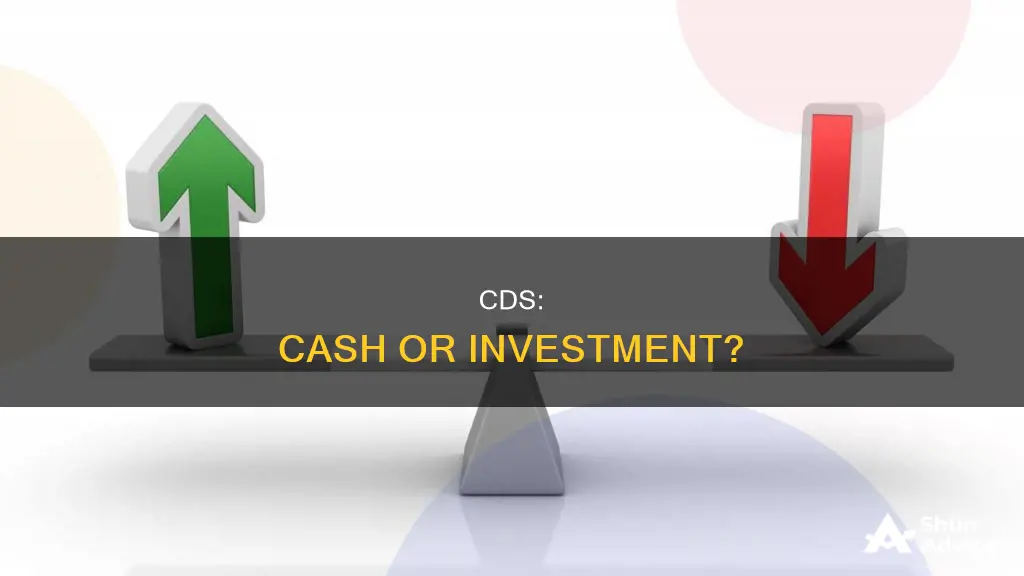
Certificates of Deposit (CDs) are a type of savings account that pays a fixed interest rate on money held for an agreed-upon period. They are considered a safe investment option, as they are insured by the Federal Deposit Insurance Corporation (FDIC) for up to $250,000. CDs offer higher interest rates than traditional savings accounts but come with early withdrawal penalties. While CDs provide a predictable return, they may not always offer a great interest rate, especially in a low-interest-rate environment. Additionally, locking your money into a CD carries the risk of losing purchasing power over time due to inflation. However, CDs can be a good option for those seeking a secure investment with a fixed rate and guaranteed return.
| Characteristics | Values |
|---|---|
| Interest rate | Fixed or variable |
| Term | 3 months to 10 years |
| Principal | The amount deposited when the CD is opened |
| Financial institution | Bank, credit union or brokerage |
| Statements | Monthly or quarterly, paper or electronic |
| Safety | One of the safest savings options |
| Risk | Inflation may grow faster than your money |
| Penalties | Forfeiture of interest or part of the original amount |
What You'll Learn

CDs are a safe investment, with federal deposit insurance covering up to $250,000
Certificates of Deposit (CDs) are a safe investment option, with federal deposit insurance covering up to $250,000 per depositor. This means that your money is secure, even if the bank or credit union fails. CDs are considered one of the safest savings options, and they are a great way to save for specific goals without taking on too much risk.
CDs are savings accounts that hold a fixed amount of money for a fixed period, such as six months, one year, or five years. In return, the bank pays interest, and when you cash in your CD, you get back your original investment plus any interest. CDs generally pay higher interest rates than savings and money market accounts, and they are a safer and more conservative investment than stocks and bonds.
One of the biggest advantages of CDs is that they offer fixed interest rates, which are often higher than other bank accounts. The longer the term, the higher the rate, and you know exactly how much you will earn by the end of the term. This makes CDs a great option for those who want a guaranteed, predictable rate of return with lower risk than volatile stocks and bonds.
CDs are also very flexible, with a wide range of terms available, typically from three months to five years, but they can be as short as one month or as long as ten years. This makes them suitable for various savings goals, whether you are saving for a house, a car, or a vacation. You can also find no-penalty CDs, which allow you to withdraw your money early without incurring a penalty, and bump-up CDs, which let you increase the interest rate if rates rise.
Another benefit of CDs is that they are easy to open and do not usually have any fees. You can open a CD in person or online in just a few minutes. Additionally, CDs are insured by the Federal Deposit Insurance Corporation (FDIC) for banks and the National Credit Union Administration (NCUA) for credit unions, so your money is safe even if the institution fails.
Overall, CDs are a safe and secure investment option, offering federal deposit insurance, competitive interest rates, and flexibility. They are a great choice for those looking for a low-risk way to save for specific goals or those who want to avoid the volatility of the stock market.
Invest Cash Safely: Strategies for Secure Financial Growth
You may want to see also

CDs have fixed rates and predictable returns
Certificates of Deposit (CDs) have fixed rates and predictable returns. This means that once you open a CD, you lock in a rate and know exactly how much money you'll earn over your CD term. This can be for a fixed period of time, such as six months, one year, or five years.
The fixed nature of CDs means that they offer a guaranteed, predictable rate of return that is less risky than volatile stocks and bonds. This makes CDs an attractive option for savers who want to earn more than they would with most savings, checking, or money market accounts, without taking on more risk.
CDs are also insured by the federal government for up to $250,000, so even if the bank or credit union goes bankrupt, your principal will very likely still be repaid. This makes CDs a safe investment, with no risk of losing money, except if you withdraw early.
CDs are a good option for those who want to avoid risking their money in the stock market and want a guaranteed return. They are also useful for those who want to save for a specific goal, such as a down payment on a house, a new car, or a vacation.
However, it's important to note that locking your money into a CD can result in missed opportunities if interest rates rise during the term. Additionally, there are usually penalties for early withdrawal, and inflation can eat away at the value of money locked in at a fixed rate.
Understanding Cash Flow: Investing Activities Explained
You may want to see also

CDs offer a variety of terms, typically ranging from three months to five years
Certificates of Deposit (CDs) are savings accounts that hold a fixed amount of money for a fixed period of time. CD terms typically range from three months to five years, but they can be as short as one month or as long as ten years. The variety of terms available helps investors find a CD that fits their needs.
CDs with longer terms usually offer higher interest rates than shorter-term CDs. For example, a CD with a term of six months may offer a lower interest rate than a CD with a term of five years. The interest rate on a CD is fixed and will not change for the duration of the term. This is different from a savings account, where the interest rate can fluctuate over time.
When you open a CD, you agree to leave your money in the account for the specified term. At the end of the term, you will receive your original investment plus any interest that has accrued. The ability to lock in a fixed interest rate for a specific period of time can be beneficial for savers who want to earn a higher rate of return on their money without taking on additional risk.
However, it's important to consider the early withdrawal penalties associated with CDs. If you need to access your money before the term is up, you will typically have to pay a penalty, which can be a significant portion of your interest or even a portion of your original deposit. This can be a drawback for those who may need access to their money in the event of an emergency or unexpected expense.
Overall, CDs offer a variety of terms to meet different savings goals and preferences. The fixed interest rate and guaranteed return can be attractive for those seeking a low-risk investment option. However, it's important to carefully consider the early withdrawal penalties and the potential impact of inflation on the purchasing power of your investment.
Cash Investment Strategies: Your Guide to Profitable Opportunities
You may want to see also

CDs have early withdrawal penalties
Certificates of deposit (CDs) are a type of savings account that allows investors to deposit a lump sum of money for a fixed period, ranging from a few months to several years. In exchange, the issuing bank pays interest. As a result, CDs are considered a low-risk investment option. However, the trade-off is that investors must keep their money locked up for the specified term. Withdrawing money from a CD before it matures typically incurs an early withdrawal penalty.
Early withdrawal penalties for CDs can vary depending on the financial institution and the specific CD product. The penalty is usually based on the interest that the CD has earned or would have earned over a specified number of days or months. Longer-term CDs tend to have higher early withdrawal penalties than shorter-term ones. In some cases, the penalty may even include a portion of the principal amount deposited, resulting in a loss of money.
It is important to carefully review the terms and conditions of a CD before purchasing it, as the early withdrawal penalties can be significant. By understanding the potential penalties, investors can make informed decisions about whether to withdraw funds early or explore alternative options, such as no-penalty CDs or CD ladders.
- Penalty amount: The penalty amount is typically calculated based on the interest earned or the number of days or months of interest forfeited. Some penalties may also include a portion of the principal amount.
- Varying penalties: Different financial institutions have different penalty structures. It is essential to review the specific terms of the CD before making a purchase decision.
- Impact of withdrawal timing: The earlier the withdrawal, the higher the penalty, as it results in forfeiting more interest.
- Comparison with other options: Early withdrawal penalties for CDs can be higher than the interest earned on savings accounts or money market accounts. It is crucial to weigh the benefits and drawbacks before deciding to withdraw funds early.
- Strategies to avoid penalties: Investors can consider alternative CD products, such as no-penalty CDs or liquid CDs, which offer more flexibility in withdrawing funds without incurring penalties.
- Penalty waiver: In certain situations, such as emergencies or special circumstances, some financial institutions may waive the early withdrawal penalty. It is worth contacting the bank or credit union to discuss waiver options.
Cashing Out Investments: Using the Cash App to Withdraw Funds
You may want to see also

CDs can be a tool for short-term savings goals
Certificates of Deposit (CDs) can be a great tool for short-term savings goals. CDs are a type of savings account that holds a fixed amount of money for a fixed period of time, such as 3 months, 6 months, 1 year, or 5 years. During this time, the issuing bank pays interest on the deposited money, which can be higher than the interest on regular savings accounts. As a result, CDs can be an effective way to save for specific short-term goals, such as a down payment on a house or a car, a vacation, or an emergency fund.
One of the main advantages of CDs is that they offer a safe and conservative investment option. CDs purchased from federally insured banks or credit unions are backed by the US government, ensuring that your money is protected. Additionally, CDs have fixed interest rates, providing predictable returns. This means that you know exactly how much money you will earn over the term of the CD, making it easier to plan and calculate your expected interest earnings.
CDs also provide flexibility in terms of the length of the investment. They typically range from 3 months to 5 years, allowing you to choose a term that aligns with your savings goals. Generally, longer-term CDs offer higher interest rates, but it's important to consider the potential for rising interest rates in the future, which could impact your returns.
To maximize the benefits of CDs, you can consider a strategy called CD laddering. This involves opening multiple CDs with different maturity dates, allowing you to access your money at regular intervals while still earning competitive interest rates. For example, you can invest in CDs with terms of 6 months, 1 year, 2 years, and 5 years, ensuring that a portion of your money becomes available every year.
However, it's important to remember that CDs have early withdrawal penalties. If you need to access your money before the maturity date, you will typically incur a penalty, such as forfeiting a portion of your interest or, in some cases, part of your original deposit. Therefore, CDs are best suited for savings goals where you are confident you won't need to access the money until the term ends.
Cash App Investment Options: Where to Put Your Money
You may want to see also
Frequently asked questions
A certificate of deposit (CD) is a type of savings account that holds a fixed amount of money for a fixed period of time, such as six months, one year, or five years. CDs are considered one of the safest savings options as they are insured up to $250,000 by the Federal Deposit Insurance Corporation (FDIC) for bank accounts and the National Credit Union Administration (NCUA) for credit union accounts.
The pros of investing in CDs include the fact that they are safe investments with federal deposit insurance and fixed, predictable returns. CDs also offer a variety of terms, which can provide structure to savings goals, and they typically pay higher interest rates than savings accounts. However, a con of investing in CDs is that you lose access to your money as it is locked in for the fixed period. There are also early withdrawal penalties and the possibility of missing out on better returns if interest rates rise.
CDs can be a good investment option if you are looking for a safe place to keep your money and want to take advantage of the relatively high-interest rates currently being offered. However, it's important to consider your financial goals and time horizon before investing in CDs, as there may be other investment options that better align with your needs.







